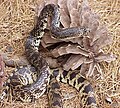Pituophis
| Pituophis | |
|---|---|

| |
| Pacific gopher snake Pituophis catenifer catenifer | |
| Scientific classification | |
| Domain: | Eukaryota |
| Kingdom: | Animalia |
| Phylum: | Chordata |
| Class: | Reptilia |
| Order: | Squamata |
| Suborder: | Serpentes |
| Family: | Colubridae |
| Tribe: | Lampropeltini |
| Genus: | Pituophis Holbrook, 1842 |
| Synonyms | |
|
Churchilla, Elaphis, Epiglottophis, Pityophis, Rhinechis | |
Pituophis is a genus of nonvenomous colubrid snakes, commonly referred to as gopher snakes, pine snakes, and bullsnakes, which are endemic to North America.
Geographic range
[edit]Species and subspecies within the genus Pituophis are found throughout Mexico, the Southern and Western United States and Western Canada.[1]
Description
[edit]All species of Pituophis are large and powerfully built. The head is relatively small in proportion to the body and it is only slightly distinct from the neck. The rostral is enlarged and elongated, imparting a characteristic somewhat pointed shape to the head. All the species occurring in the United States have four prefrontals instead of the usual two.[1]
Modified epiglottis
[edit]In all snakes of the genus Pituophis, the epiglottis is peculiarly modified so that it is thin, erect and flexible. When a stream of air is forced from the trachea, the epiglottis vibrates, thereby producing the peculiarly loud, hoarse hissing for which bullsnakes, gopher snakes and pine snakes are well known.[2]
Species and subspecies
[edit]| Image | Scientific name | Common Name | Subspecies | Distribution |
|---|---|---|---|---|
 |
Pituophis catenifer (Blainville, 1835) | gopher snake |
|
North America |
| Pituophis deppei (A.M.C. Duméril, 1853) | Mexican bullsnake |
|
central, Mexico | |
| Pituophis insularis Klauber, 1946 | Credos Island gopher snake | Isla de Credos, Mexico | ||
 |
Pituophis lineaticollis (Cope, 1861) | Middle American gopher snake |
|
From Mexico city, south through Mexico and to Guatemala |
 |
Pituophis melanoleucus (Daudin, 1803) | pine snake | southeastern United States | |
 |
Pituophis ruthveni Stull, 1929 | Louisiana pine snake | west-central Louisiana and East Texas | |
 |
Pituophis vertebralis (Blainville, 1835) | Cape gopher snake | southern Baja California Sur, Mexico. |
References
[edit]- ^ a b Conant R (1975). A Field Guide to Reptiles and Amphibians of Eastern and Central North America, Second Edition. Boston: Houghton Mifflin. ISBN 0-395-19977-8 (paperback). (Genus Pituophis, pp. 198–201 + Plate 27 + figure 57 + Map 147).
- ^ Schmidt KP, Davis DD (1941). Field Book of Snakes of the United States and Canada. New York: G.P. Putnam's Sons. 365 pp. (Genus Pituophis, pp. 158–160).
- ^ "Santa Cruz Island Gopher Snake - Channel Islands National Park (U.S. National Park Service)".
Further reading
[edit]- Holbrook, John Edwards (1842). North American herpetology : or, A description of the reptiles inhabiting the United States. Vol. IV. Philadelphia: J. Dobson. p. 7.
External links
[edit]Pituophis.
- Genus Pituophis at The Reptile Database
- Accounts of four subspecies, P. deppei deppei, P. deppei jani, P. lineaticollis lineaticollis and P. lineaticollis gibsoni, are given in Duellman WE (1960). "A Taxonomic Study of the Middle American Snake, Pituophis deppei". University of Kansas Publications, Museum of Natural History 10: 599–610.
